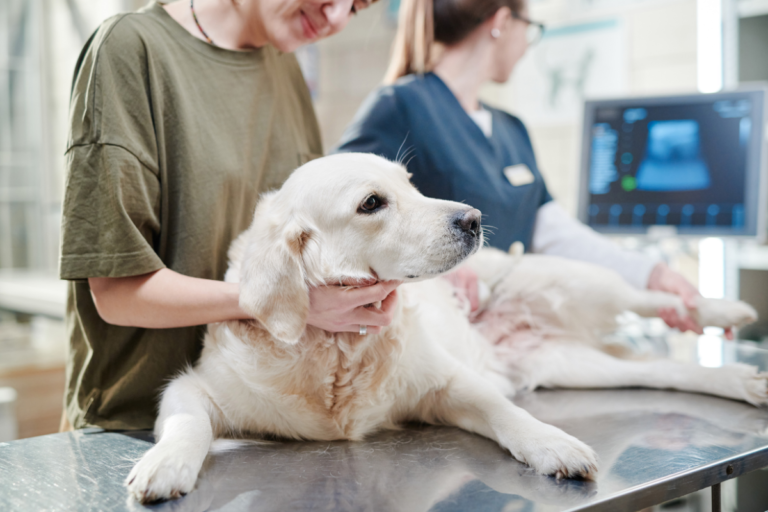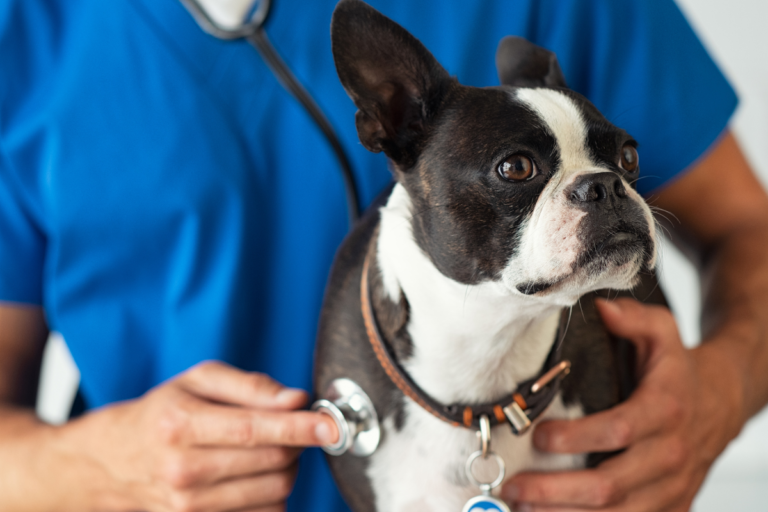Together Against Troubles: Conquering the World of Dog Diseases
Preventing Common Dog Diseases
Keeping our furry pals in tip-top shape means going the extra mile. We’re spilling the beans on why those vet trips, health check-ups, and watching the waistline are game-changers in dodging doggy diseases.
Importance of Routine Veterinary Visits
Trips to the vet are a big deal for keeping our pups in perfect health. Folks at American Animal Hospital Association (AAHA) remind us that at least one annual vet visit is a must for all pets. Got an old timer or a dog with health quirks? Pencil in more frequent check-ups.
Regular vet visits are like a superhero cape for worrisome health issues—spotting them early saves money and stress, both for us and our four-legged friends (Pet-Power.eu). These visits usually involve shots, protection against pests, regular deworming, teeth check-ups, and a thorough once-over, all super important for keeping illnesses at bay.
Health Screening Tests for Dogs
Health screens act like future-seeing goggles for catching health hiccups before they turn into big headaches. How often? Well, that depends on the dog’s age, shape, breed, and way of life. Those adorable puppies? Expect about five vet dates by the time they hit six months. Adult dogs? Once a year sounds right. And those golden oldies? Try every six months (Pet-Power.eu).
Here’s a quick hit-list of health tests:
- Blood Tests: Hunt down infections or blood stuff gone wrong.
- Urinalysis: Sniff out kidney or bladder trouble.
- Fecal Exams: Uncover any creepy crawly intestinal squatters.
- Dental Exams: Keep a lookout for yucky teeth issues like periodontal disease.
These check-ups help nip problems in the bud, so our dogs stay sprightly and cheerful.
Managing Obesity in Dogs
Chubby puppies aren’t just cute, they come with a host of health issues like diabetes and heart woes. Taming that fluff is super important.
| Health Ruckus | Obesity’s Wrath |
|---|---|
| Diabetes | It ramps up and messes with sugar control |
| Heart Disease | Heart’s working OT, risking heart failure |
| Arthritis | Extra pounds pile pressure on joints, triggering aches and motion troubles |
Good food and regular jogs around the block can help trim the flab off an overweight dog. Keeping them within that ideal weight range keeps a lot of nasty diseases away and makes sure they stick around as our best friends for longer.
Want more doggy health tips? Dive into our articles on dog diseases and symptoms and dog illnesses for the scoop!
Common Health Issues in Dogs
Dental Diseases in Dogs
Who would’ve thought that even dogs need a trip to the dentist, right? Yet, about 80% of our canine buddies start having tooth troubles by age two. It all boils down to one thing—dental hygiene or the lack thereof. Periodontal disease is the main troublemaker, leading to issues that sometimes even call for pulling out teeth to keep infections at bay. So, keep an eye on those doggie dental visits and get familiar with brushing techniques. Looking for more tips? Check out our doggy dental guide.
| Dental Disease | Prevalence (%) |
|---|---|
| Periodontal Disease | 80% by age of 2 |
Need some extra bark about dental diseases? We’ve got more info here.
Skin Allergies and Food Allergies
Turns out, dogs face the itch from skin allergies more often than tummies upset with food allergies. Atopic dermatitis is frequently behind those red, itchy, scaly skin moments. For food allergies, it’s all about tweaking the diet, but skin allergies often call for a hand from good ol’ Benadryl. As always, tag-team with your vet to uncover and zap those pesky allergens.
Ear Infections and Their Treatment
Dog ears are delightful but can be trouble-prone. Allergies, immune issues, or even plain wax can lead to infections. Watch out for tell-tale signs like relentless scratching or some head thrashing, bad odors, gooey secretions, or ear canal puffiness. Treatment’s usually a mix of washes, topical meds, or antibiotics. Keeping ears clean and dry is often the best preventative wag you can give.
Sniff out more on dog ear problems here.
Breed-Related Health Concerns
Dogs come in all shapes, sizes, and personalities—and some health quirks, too. For instance, German Shepherds might face a hip that doesn’t quite fit right, leading to a limpy walk and joint issues—the famous hip dysplasia. French Bulldogs, on the other hand, have breathing hiccups. It’s best to stay in the loop on breed-specific needs and check in with the vet regularly.
| Breed | Health Concern | Prevalence |
|---|---|---|
| German Shepherds | Hip Dysplasia | High |
| French Bulldogs | Breathing Problems | High |
Sniffing out knowledge on breed quirks? We got it all right here for German Shepherds and French Bulldogs.
Helping our four-legged pals lead their healthiest, happiest lives means staying informed and observant. Routine vet visits, keeping tidy, and minding the specific quirks of their breed is the trick. For all things dog health, check out more on dog diseases and symptoms.
Vaccines and Disease Prevention
Caring for our four-legged buddies involves more than just belly rubs and playtime; it includes keeping them safe from nasty bugs out there. When we know what diseases are waiting to pounce, especially when our dogs mingle with others, we can step up and keep them wagging their tails.
Common Diseases in Social Settings
Dogs are social animals, and they love making doggy friends. But with playdates come potential health risks. Common diseases they might catch include distemper, dog flu, parvo, kennel cough, and rabies. Good news? There are vaccines to keep these at bay.
| Disease | Symptoms | Vaccine Available |
|---|---|---|
| Canine Distemper | Fever, runny nose, hacking cough, sluggishness | Yep |
| Canine Influenza | Barking cough, runny nose, fever | Yep |
| Canine Parvovirus | Throwing up, the runs, drained energy | Yep |
| Kennel Cough | Persistent cough, runny nose, gagging | Yep |
| Rabies | Getting snappy, can’t move, slobbering | Yep |
Symptoms and Prevention of Heatstroke
When it’s hot outside, dogs can get into trouble with too much sun, particularly if they’re running about. If they start panting like crazy, drooling like they’re at a BBQ, looking weak, have strange gum color, or suddenly hit the ground, they may be in big trouble from heatstroke. Act fast! Cool them down with a damp cloth and get them out of that blazing sun.
| Symptom | Description |
|---|---|
| Excessive Panting | Quick breaths to cool off |
| Drooling | More spit than usual |
| Weakness | Acting like they’re out of juice |
| Abnormal Gum Color | Gums look pale or super red |
| Collapse | Hitting the deck, no consciousness |
To sidestep heatstroke, walk your pooch on the cooler side of the day and keep water and a chill spot handy. Check out our heatstroke prevention tips for more tricks.
Preventing External Parasites in Dogs
Nobody likes being bugged by bugs. Dogs least deserving. Fleas, ticks, and mange are uninvited guests that make dogs itch and whine. Often contracted from other pets or their favorite hangouts.
| Parasite | How They Sneak In | Prevention |
|---|---|---|
| Ticks | Tall grass, other dogs | Anti-tick concoctions |
| Fleas | Other sunbathers, outdoors too | Foolproof flea busters |
| Mange | Mite-ridden pals | Mange busting brew |
Your vet is your best bud when picking products to fight these pests. Curious about ticks? Peek at our ticks info.
Heartworm Infection and Prevention
Mosquitoes aren’t just annoying; they can give dogs heartworm, which is serious business. Those worms, chilling in your pooch’s heart and vessels, can turn into big problems: lung issues, heart failings, the works.
| Prevention Method | Description |
|---|---|
| Monthly Medications | Chewable or skin-saving drops |
| Annual Injections | Long-haul heartworm defense |
| Regular Testing | Spotting bugs early with blood checks |
Always important: Have a chit-chat with your vet to sort out the best heartworm fixer-upper for your pup. Curious plushies can head over to our heartworm guide.
Keeping our dogs fit isn’t just a tagline; it’s a promise. Arm yourself with knowledge, keep up with jabs, and check in with the vet. Looking out for their health is part and parcel of the joy of having our furry fam.
Understanding and Managing Specific Diseases
Canine Parvovirus (Parvo)
Canine parvovirus, or parvo for short, is a pesky little virus that hits dogs hard, especially the young pups. It’s like the common cold if colds were really, really nasty. You might have heard of CPV-2, CPV-2a, and their gang. They all cause similar symptoms, and spoilers: none of them are pleasant. Parvo is all over the US and spreads faster than gossip at a dog park.
Symptoms of Parvo:
- Explosive vomiting
- Nasty, bloody diarrhea
- Snooze mode activated (lethargy)
- Dehydration and tummy grumbles
- A fever that could cook an egg
Symptoms crash the party about three to seven days after your pup’s been exposed, and they don’t waste time getting worse (VCA Hospitals).
Prevention and Treatment of Parvovirus
We can’t stress enough: vaccines are your pup’s best friend against parvo. Get those jabs done on time, and you can skip the fever and puke parade.
For treatment:
- If things get real bad – hospital time.
- IV drips to tackle dehydration like a boss.
- Meds to keep the vomrain at bay.
Catch it early, and your dog’s got a swell chance of bouncing back with a survival rate up to 90% (VCA Hospitals). Quick help and lots of love are key to winning this fight.
Cancer in Dogs
Cancer’s a sneaky player in the dog world. It can appear like a bump or spread like peanut butter. It’s all about rule-breaking cell growth that can mess up surrounding areas. Different cancers bring different chaos, so watch out.
Common Symptoms of Cancer:
- Random lumps or bumps
- Sores that prefer a long-term commitment
- Weight loss without the hard work
- Trouble munching or swallowing
Treatments can range from slicing it away to dosing with drugs or using radiation, and a fancy term called immunotherapy. Getting a second opinion is like choosing your dog’s dream team (ASPCA). For breed-specific health biz, check our stuff on cavalier health, or if your pal’s an English Bulldog, their health probs and for hearts, dog heart disease.
Diabetes and Heartworm Disease in Dogs
Diabetes in Dogs
Diabetes in dogs is usually about insulin—or lack of it. Most common: Type I, insulin-dependent diabetes that’s asking for insulin shoutouts regularly.
Symptoms of Canine Diabetes:
- Thirst and pee game is strong
- Hungry but missing pounds
- Lazing around more than usual
You can manage it with regular insulin jabs and keeping an eye on sugar levels (ASPCA). Wanna know more? Hit up our dog diabetes symptoms guide.
Heartworm Disease
Heartworm: tiny worms making themselves at home in your dog’s ticker. They hate leaving a hint until it’s a real problem, so regular check-ups are a must.
| Stage | Symptoms |
|---|---|
| Early Stage | Gentle cough, tuckered out after some light play |
| Middle Ground | Not game for exercise, appetite hits the snooze, dropping weight |
| Going Nowhere Good | Puffy belly, heart not pulling its weight, ready to faint |
Preventing it’s all about monthly doses of those heartworm-preventers. Chat with your vet to land the right plan for your pooch. Check out our bit on heartworm infection and prevention.
Knowing the nitty-gritty on these health hassles keeps us ready to keep our fur babies in tip-top shape. And yep, regular vet visits are your secret weapon for nipping any trouble in the bud.






